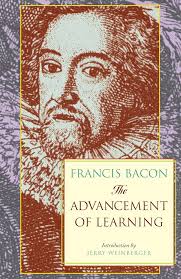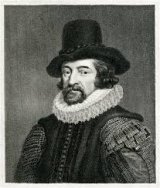The Advancement of Learning Page #33
The Advancement of Learning, published by Francis Bacon in 1605, is a foundational text in the history of science and philosophy. In this work, Bacon advocates for empirical research and the systematic organization of knowledge, laying the groundwork for the scientific method. The book critiques existing scholarly practices and proposes a new approach to learning based on observation and experimentation. It marks a significant shift towards modern scientific inquiry.
- Year:
- 1605
- 1,164 Views
Submitted by acronimous on August 11, 2024
Modified by acronimous on August 11, 2024
impossibility you add what thing is extant which cometh the nearest in degree to that impossibility; to the end that by these optatives and potentials man’s inquiry may be the more awake in deducing direction of works from the speculation of causes. And secondly, that these experiments be not only esteemed which have an immediate and present use, but those principally which are of most universal consequence for invention of other experiments, and those which give most light to the invention of causes; for the invention of the mariner’s needle, which giveth the direction, is of no less benefit for navigation than the invention of the sails which give the motion. (4) Thus have I passed through natural philosophy and the deficiences thereof; wherein if I have differed from the ancient and received doctrines, and thereby shall move contradiction, for my part, as I affect not to dissent, so I purpose not to contend. If it be truth, “Non canimus surdis, respondent omnia sylvæ,” the voice of Nature will consent, whether the voice of man do or no. And as Alexander Borgia was wont to say of the expedition of the French for Naples, that they came with chalk in their hands to mark up their lodgings, and not with weapons to fight; so I like better that entry of truth which cometh peaceably with chalk to mark up those minds which are capable to lodge and harbour it, than that which cometh with pugnacity and contention. (5) But there remaineth a division of natural philosophy according to the report of the inquiry, and nothing concerning the matter or subject: and that is positive and considerative, when the inquiry reporteth either an assertion or a doubt. These doubts or non liquets are of two sorts, particular and total. For the first, we see a good example thereof in Aristotle’s Problems which deserved to have had a better continuance; but so nevertheless as there is one point whereof warning is to be given and taken. The registering of doubts hath two excellent uses: the one, that it saveth philosophy from errors and falsehoods; when that which is not fully appearing is not collected into assertion, whereby error might draw error, but reserved in doubt; the other, that the entry of doubts are as so many suckers or sponges to draw use of knowledge; insomuch as that which if doubts had not preceded, a man should never have advised, but passed it over without note, by the suggestion and solicitation of doubts is made to be attended and applied. But both these commodities do scarcely countervail and inconvenience, which will intrude itself if it be not debarred; which is, that when a doubt is once received, men labour rather how to keep it a doubt still, than how to solve it, and accordingly bend their wits. Of this we see the familiar example in lawyers and scholars, both which, if they have once admitted a doubt, it goeth ever after authorised for a doubt. But that use of wit and knowledge is to be allowed, which laboureth to make doubtful things certain, and not those which labour to make certain things doubtful. Therefore these calendars of doubts I commend as excellent things; so that there he this caution used, that when they be thoroughly sifted and brought to resolution, they be from thenceforth omitted, discarded, and not continued to cherish and encourage men in doubting. To which calendar of doubts or problems I advise be annexed another calendar, as much or more material which is a calendar of popular errors: I mean chiefly in natural history, such as pass in speech and conceit, and are nevertheless apparently detected and convicted of untruth, that man’s knowledge be not weakened nor embased by such dross and vanity. As for the doubts or non liquets general or in total, I understand those differences of opinions touching the principles of nature, and the fundamental points of the same, which have caused the diversity of sects, schools, and philosophies, as that of Empedocles, Pythagoras, Democritus, Parmenides, and the rest. For although Aristotle, as though he had been of the race of the Ottomans, thought he could not reign except the first thing he did he killed all his brethren; yet to those that seek truth and not magistrality, it cannot but seem a matter of great profit, to see before them the several opinions touching the foundations of nature. Not for any exact truth that can be expected in those theories; for as the same phenomena in astronomy are satisfied by this received astronomy of the diurnal motion, and the proper motions of the planets, with their eccentrics and epicycles, and likewise by the theory of Copernicus, who supposed the earth to move, and the calculations are indifferently agreeable to both, so the ordinary face and view of experience is many times satisfied by several theories and philosophies; whereas to find the real truth requireth another manner of severity and attention. For as Aristotle saith, that children at the first will call every woman mother, but afterward they come to distinguish according to truth, so experience, if it be in childhood, will call every philosophy mother, but when it cometh to ripeness it will discern the true mother. So as in the meantime it is good to see the several glosses and opinions upon Nature, whereof it may be everyone in some one point hath seen clearer than his fellows, therefore I wish some collection to be made painfully and understandingly de antiquis philosophiis, out of all the possible light which remaineth to us of them: which kind of work I find deficient. But here I must give warning, that it be done distinctly and severedly; the philosophies of everyone throughout by themselves, and not by titles packed and faggoted up together, as hath been done by Plutarch. For it is the harmony of a philosophy in itself, which giveth it light and credence; whereas if it be singled and broken, it will seem more foreign and dissonant. For as when I read in Tacitus the actions of Nero or Claudius, with circumstances of times, inducements, and occasions, I find them not so strange; but when I read them in Suetonius Tranquillus, gathered into titles and bundles and not in order of time, they seem more monstrous and incredible: so is it of any philosophy reported entire, and dismembered by articles. Neither do I exclude opinions of latter times to be likewise represented in this calendar of sects of philosophy, as that of Theophrastus Paracelsus, eloquently reduced into an harmony by the pen of Severinus the Dane; and that of Tilesius, and his scholar Donius, being as a pastoral philosophy, full of sense, but of no great depth; and that of Fracastorius, who, though he pretended not to make any new philosophy, yet did use the absoluteness of his own sense upon the old; and that of Gilbertus our countryman, who revived, with some
Translation
Translate and read this book in other languages:
Select another language:
- - Select -
- 简体中文 (Chinese - Simplified)
- 繁體中文 (Chinese - Traditional)
- Español (Spanish)
- Esperanto (Esperanto)
- 日本語 (Japanese)
- Português (Portuguese)
- Deutsch (German)
- العربية (Arabic)
- Français (French)
- Русский (Russian)
- ಕನ್ನಡ (Kannada)
- 한국어 (Korean)
- עברית (Hebrew)
- Gaeilge (Irish)
- Українська (Ukrainian)
- اردو (Urdu)
- Magyar (Hungarian)
- मानक हिन्दी (Hindi)
- Indonesia (Indonesian)
- Italiano (Italian)
- தமிழ் (Tamil)
- Türkçe (Turkish)
- తెలుగు (Telugu)
- ภาษาไทย (Thai)
- Tiếng Việt (Vietnamese)
- Čeština (Czech)
- Polski (Polish)
- Bahasa Indonesia (Indonesian)
- Românește (Romanian)
- Nederlands (Dutch)
- Ελληνικά (Greek)
- Latinum (Latin)
- Svenska (Swedish)
- Dansk (Danish)
- Suomi (Finnish)
- فارسی (Persian)
- ייִדיש (Yiddish)
- հայերեն (Armenian)
- Norsk (Norwegian)
- English (English)
Citation
Use the citation below to add this book to your bibliography:
Style:MLAChicagoAPA
"The Advancement of Learning Books." Literature.com. STANDS4 LLC, 2025. Web. 8 Mar. 2025. <https://www.literature.com/book/the_advancement_of_learning_3165>.








Discuss this The Advancement of Learning book with the community:
Report Comment
We're doing our best to make sure our content is useful, accurate and safe.
If by any chance you spot an inappropriate comment while navigating through our website please use this form to let us know, and we'll take care of it shortly.
Attachment
You need to be logged in to favorite.
Log In